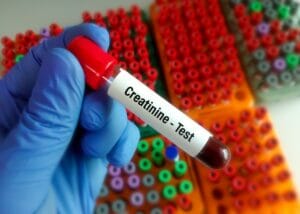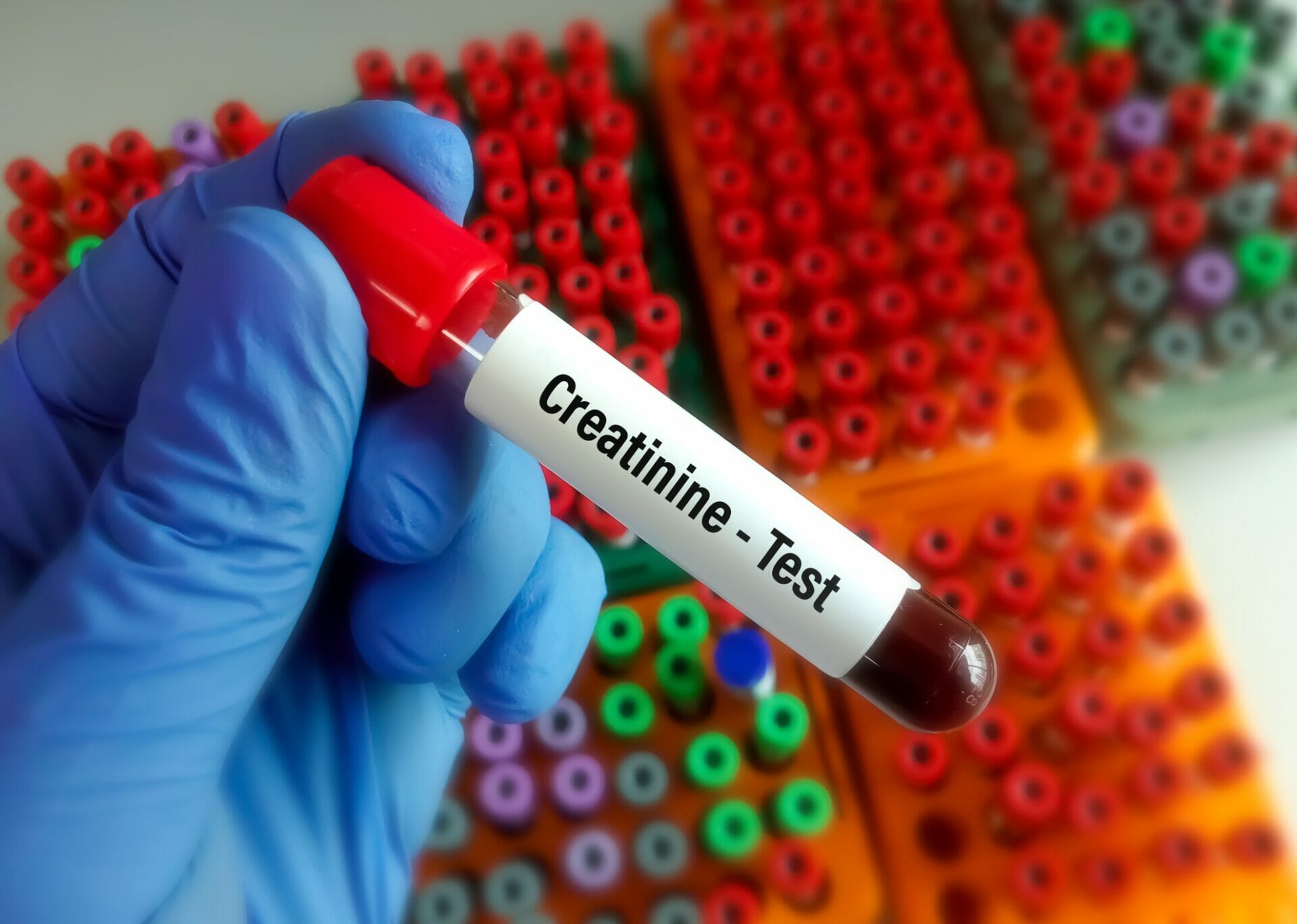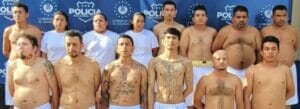
Civil Society, Crime & Justice, Editors’ Choice, Featured, Headlines, Human Rights, Latin America & the Caribbean, Regional Categories
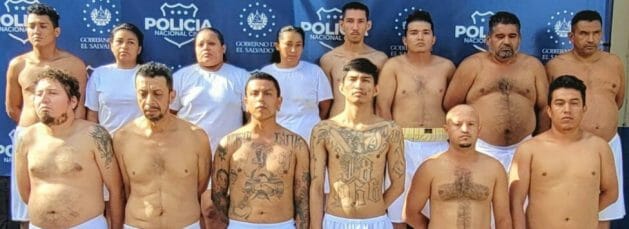
A group of alleged gang members is presented to the media by police authorities in El Salvador on Jul. 20 as a demonstration of the effectiveness of the war against gangs waged in this Central American country under a state of emergency. But families of detainees and human rights organizations warn that in many cases they have no links to criminal organizations. CREDIT: National Civil Police
– The body of Walter Sandoval shows a number of dark bruises on his arms and knees, as well as lacerations on his left eye and on his head – signs that he suffered some kind of violence before dying in a Salvadoran prison, accused of being a gang member.
The evidence of the beating is clear in photographs that Walter’s father, Saúl Sandoval, showed to IPS.
Walter, 32, was one of those who died in Salvadoran prisons after being detained by the authorities in the massive raids that the government of Nayib Bukele launched at the end of March, under the protection of the decreed state of emergency and the administration’s fight against organized crime and gangs.
The young man, a farmer, died on Apr. 3, in the parking lot of the hospital in Sonsonate, a city in the west of the country where he was transferred, already dying according to the family, from the police station in Ahuachapán, a city in the department of the same name in western El Salvador.
He had been transferred to the police station after his Mar. 30 arrest in the Jardines neighborhood of the municipality of El Refugio, also in the department of Ahuachapán.
“They tortured him in the dungeons of the Ahuachapán police station,” his father told IPS.
He added that his son had been hanging out with friends, getting drunk. A few minutes later, a police patrol picked him up on charges of being a gang member, which the family vehemently told IPS was not true.
“He never received medical assistance, he died in the hospital parking lot,” the father added.
“They tortured him in the dungeons of the Ahuachapán police station. He didn’t receive medical assistance, he died in the hospital parking lot.” — Saúl Sandoval
He says the only explanation he has for why the police detained Walter is because “they wanted to get the day’s quota.” What he meant is that police officers are apparently supposed to arrest a specific number of gang members in exchange for benefits in their assigned workload.
Deaths like Walter’s, if the participation of police is confirmed, are the most violent and arbitrary expression of the human rights violations committed since the government began its plan of massive raids, in what it describes as an all-out war on gangs.
Since late March, the Salvadoran government has maintained a state of emergency that suspended several constitutional guarantees, in response to a sharp rise in homicides committed by gang members between Mar. 25 and 27.
In those three days, at least 87 people were killed by gang members, in a kind of revenge against the government for allegedly breaking an obscure under-the-table agreement with the gangs to keep homicide rates low.
The state of emergency has been in place since Mar. 27, extended each month by the legislature, which is largely dominated by the ruling New Ideas party. Since then, violent deaths have dropped to an average of three a day.
Among the constitutional rights suspended are the rights of association and assembly, although the government said it only applies to criminal groups that are meeting to organize crimes. It also restricts the right to defense and extends the period in which a person may be detained and brought before the courts, which is currently three days.
The government can also wiretap the communications of “terrorist groups”, meaning gangs, although it could already do so under ordinary laws.
After the state of emergency was declared, homicides dropped again to around two or three a day, and there are even days when none are reported.
But some 48,000 people have been arrested and remanded in custody, accused by the authorities of belonging to criminal gangs. And the number is growing day by day.
However, the families of detainees and human rights organizations complain that among those captured are people who had no links to the gangs, known as “maras” in El Salvador, which make up an army of a combined total of around 70,000 members.
On Jun. 2, rights watchdog Amnesty International stated in an official communiqué that “Under the current state of emergency, the Salvadoran authorities have committed massive human rights violations, including thousands of arbitrary detentions and violations of due process, as well as torture and ill-treatment, and at least 18 people have died in state custody.”
But President Bukele, far from being receptive to criticism, dismisses and stigmatizes the work of human rights groups, referring to their representatives as “criminals” and “freeloaders” who are more interested in defending the rights of gang members than those of their victims.
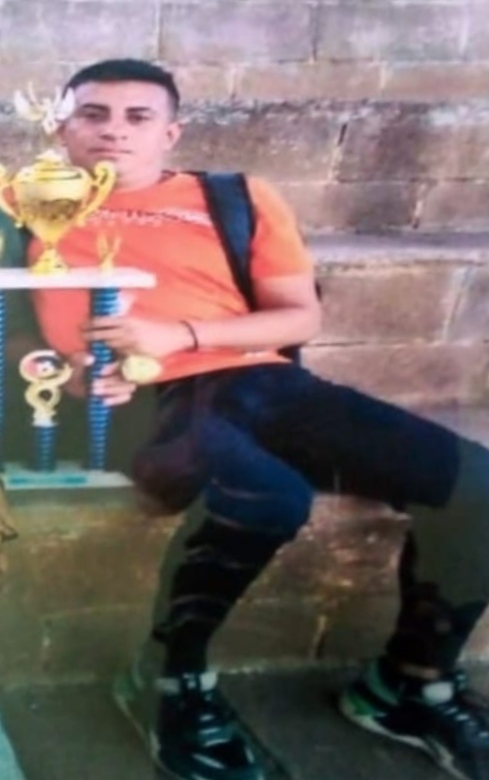
Walter Sandoval is one of the young men who have died with signs of torture in El Salvador’s prisons under the state of emergency in force in the country since the end of March. The police captured him without any evidence linking him to gangs, said the young man’s family – part of a pattern that has been documented by human rights organizations. CREDIT: Courtesy of the Sandoval family
Silent deaths and torture
The local human rights organization Cristosal has documented nearly 2,500 cases of arrests which, according to the families, have been arbitrary, with no basis for their loved ones to have been detained under the state of emergency.
The organization has also monitored press reports and social networks and has carried out its own research to establish that, as of Jul. 28, some 65 people had died while detained in the country’s prisons or in police cells as part of the massive police raids.
Some of the deceased showed obvious signs of beatings and physical violence, as was the case with Walter and other cases that have been widely reported in the media.
The official reports of these deaths received by family members are vague and confusing, such as that of Julio César Mendoza Ramírez, 25, who died in a hospital in San Salvador, the country’s capital, on Jul. 15.
The official report stated that he had died of pulmonary edema, i.e., his lungs filled with fluid, but also stated that the case was “being studied.”
Suspicions that the deceased were victims of beatings and torture during their imprisonment are not ruled out by their relatives or by human rights organizations.
“The cause of death given to the relatives in the hospital sometimes differs from the legal medical examination, and that leads one to think that something is going on,” lawyer Zaira Navas, of Cristosal, told IPS.
She added: “There are also families who say they were told it was cardiac arrest, but the victims have bruises on their bodies, which is not compatible (with the official version).”
And in the face of doubts and accusations that beatings and torture are taking place under the watchful eye of the State, the authorities simply remain silent and do not carry out autopsies, for example, which would reveal what really happened.
Navas remarked that, even within the state of emergency, “the detentions are arbitrary” because the procedure followed is not legally justified and many people are detained simply because of telephone complaints from neighbors – with which other human rights defenders coincide.
Another problem is that among these 2,500 complaints by families, about 30 percent involve detainees who have chronic diseases or disabilities or were receiving medical or surgical treatment, according to Cristosal’s reports.
The prison staff do not allow family members of the sick detainees to bring their medication, although in a few rare cases they have authorized it.
“We have seen deaths because it is presumed that they have been tortured, beaten, etc., but there have also been deaths of people who have not been given the medication they need to take,” Henri Fino, executive director of the Foundation for Studies on the Application of Law (FESPAD), told IPS.
Regarding the dubious role played by the government’s Institute of Legal Medicine (IML), in charge of conducting the forensic examinations to inform families about the cause of deaths, Fino said that in his opinion it has no credibility.
Especially, he added, now that members of the so-called Military Health Battalion have been stationed since Jul. 4 at several IML offices, presumably to assist in various tasks, including forensic exams, given the shortage of staff.
“What collaboration can they (the military) provide, if they are not experts, and the only reason they are in the IML is to exercise oversight?” Fino said.
Media war
Some of the people who have died in jails or prisons, who were arrested under the state of emergency, were described by the local media as victims of arbitrary, illegal detentions, in contrast with Bukele’s propaganda war claiming that all the detainees are, in fact, gang members.
The press has highlighted the case of Elvin Josué Sánchez, 21, who died on Apr. 18 at the Izalco Prison located near the town of the same name in the department of Sonsonate in western El Salvador.
The media have referred to him as the “young musician”, because he had been learning to play the saxophone, and they have described him as a decent person who was a member of an evangelical church in the area.
But according to neighbors, Sánchez was well-known as an active gang member in his native El Carrizal, in the municipality of Santa Maria Ostuma, in the central department of La Paz.
“They saw him well-armed on farms in the area, along with other gang members, and he told the owners not to show up there anymore, or they would kill them,” a resident of that municipality, who asked not to be identified, told IPS.
Contradictions like this have strengthened local support for Bukele’s insinuations that the independent media are in favor of gang members and against the government’s actions to eradicate violence in the country.
In fact, opinion polls show that a majority of the population of 6.7 million support the president’s measures to crack down on the maras.
But even though Sánchez was recognized by neighbors as a gang member, his arrest should have been carried out following proper procedures and protocols, based on reliable information proving his affiliation to a criminal organization.
This is something the police do not usually do in these massive raids where it is impossible for them to have the evidence needed on each of the nearly 48,000 detainees.
Nor did the fact that he had been a gang member merit him being beaten to death, since his human rights should have been respected, said those interviewed by IPS.

